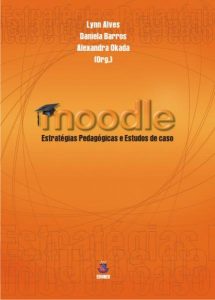News Story
The first handbook of research on Moodle launched today!
Alexandra Okada, Thursday 17 Dec 2009
Today, the National University of Bahia in Salvador, Brazil launches the first handbook of research on Moodle pedagogical strategies and case studies.
This book, published in Portuguese, was edited by Dr. Lynn Alves from the UNEB University (Brazil), Dr. Daniela Melare from UNED (Spain) and UALG (Portugal) and Dr. Alexandra Okada from the Open University, UK (KMi). Its fifteen chapters, from 26 authors focuses on theoretical background and practice, collaborative environments and media tools for teaching and learning with Moodle.
This wide-ranging book makes a significant contribution to the growing literature on online learning using open source educational technologies. This is the first book to have assembled the work of internationally renowned practitioners and scholars who combine theory with practice to provide Moodle users with significant applications and effective methodologies. The Moodle community has been growing rapidly in the world with 30,176,528 users in 2,770,832 courses in more than 200 countries (Moodle.org, 2009)
In the first chapter, Martin Dougiamas – the creator of Moodle – with Peter Taylor, outlines the methodology used to construct Moodle – a Modular Object-Oriented Dynamic Learning Environment. He summarizes his doctoral research project, and describes the theoretical approach in which Moodle is grounded, based on social constructivism, constructionism and collaborative discourse.
The following chapters cover a wide-range of topics such as:
Key issues for designing collaborative environments
Continuous professional development of teachers
Argumentative maps and webconferencing for online learning
Learning styles in virtual learning environments
Multiple pedagogical intermediation with new media tools integrated in Moodle
Learning objects, SCORM, and interactive interfaces
Virtual lab in Moodle
Synchronous and asynchronous tools in Moodle for e-learning and b-learning
EASY interface in Moodle for special needs learners
Meaningful learning and Self-learning management
Interactive contents
Case studies also describe the integrated use of Moodle with knowledge media tools, for instance, Compendium and FlashMeeting developed by the Knowledge Media Institute. Two chapters analyze elearning projects using these tools with Moodle in the UK by Ale Okada and in Brazil by Saburo Okada.
"The book is dedicated to one of its authors, my father, who passed away three weeks before its launch".
Connected
Latest News
Three KMi researchers were recognised as top scientists in Computer Science at the OU
KMi’s Generative AI mini-Scotland Tour
AI for the Research Ecosystem workshop #AI4RE
KMi congratulates Dr. Joseph Kwarteng for successfully defending his doctoral thesis







